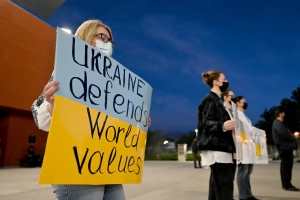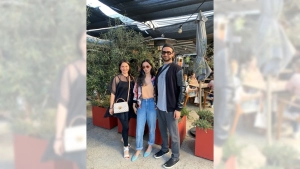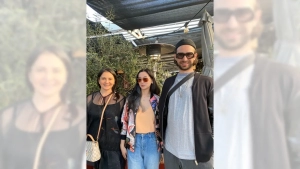Family pets deserve compassion in times of war, natural disasters
The war in Ukraine has touched close to home for me. Irina Khoranova, our payroll administrative associate at Pasadena Humane, is from Russia. She moved to Pasadena to be close to her daughter, Viktoria, and her son-in-law, Jonathan, who is from Ukraine.
This personal connection has provided me with some insight into what is happening in Eastern Europe.
Irina’s son-in-law left California last week for Romania, where he hopes to reunite with his mother, father and sister. His family is trying to escape Ukraine, along with millions of other evacuees. On leaving Pasadena, Jonathan promised his wife and mother-in-law that he would stay in Romania. He even left behind his Ukrainian passport as evidence of his intention. However, Irina and Viktoria are terrified that Jonathan will cross into Ukraine in an effort to locate his parents.
The situation is also dire for Irina’s mother and two sisters, who are living in Russia. They report that grocery store shelves are empty. And medicine cannot be found. Irina’s mother has diabetes, so the family has desperately been working on getting their hands on the medication she needs for survival.
None of these people from Russia or Ukraine, who are directly and indirectly connected to Southern California, have any argument with one another or desire for conflict. They are innocent victims of a totalitarian regime. I worry about other innocent victims of this horrific conflict…the animals.
In America, we share a love of pets with the people of Russia and Ukraine.
Hurricane Katrina taught us that people will choose to perish in the aftermath of a disaster rather than leave their pets behind to flee. It is heartwarming to see that the people of Poland, Latvia, Hungary and other countries have not only opened their hearts and their homes to Ukrainians fleeing the war. They have also embraced the pets of Ukraine.
While pets must normally be vaccinated and microchipped to cross international borders, many countries have agreed to an exception during this crisis. In many cases, if a pet is not vaccinated or microchipped, the receiving country will vaccinate and microchip the pet upon entry. I am extremely grateful to the countries that have made it possible for families to evacuate Ukraine with their pets.
Many pets will still suffer. If there is no food or medicine for people in Russia, imagine how the animals must be faring. And in Ukraine, the devastation leaves many dangers for pets whose owners have died or have been forced to abandon their pets. These poor creatures are suddenly homeless, petrified and alone.

Oksana Ulianchenko holds a sign during a “Stand with Ukraine” solidarity candlelight vigil, Thursday, March 17, 2022, at Los Angeles Valley College. The event included a solidarity walk around campus, plus remarks from Farrell Broslawsky, a professor emeritus of history.
In all the sadness and senseless destruction, it’s the stories of the bravery and compassion of volunteers and organizations going into the war-torn country to provide aid that help me keep my faith in humanity.
Many animal-welfare organizations are working to provide relief. I encourage you to do your research and see if you might be interested in contributing to those organizations that are trying to help. Of course, by helping pets, you are helping their people, too.
My hope is that Ukrainians who have been forced to leave their homes and belongings behind will find comfort in being able to bring their beloved pets with them as they evacuate.
It’s an important time for us to remember that the most important things in life are not things. We should all be extraordinarily grateful for the people and pets who enrich our lives.
Dia DuVernet is president and CEO of Pasadena Humane.
This blog post originally appeared as a column in the Pasadena Star-News on March 18, 2022.




